News
Superconductivity’s current help for the environment

Environmental Research Web, 18 October 2013
environmentalresearchweb.org/cws/article/opinion/55067
Superconductors could cut carbon emissions by boosting power transmission, transforming wind energy, creating more efficient supercomputers for climate models, enabling renewable energy storage, aiding train travel, and more, says a review in Superconductor Science and Technology.
READ ARTICLE AT Environmental Research Web
Weatherwatch: Flashes from the ash
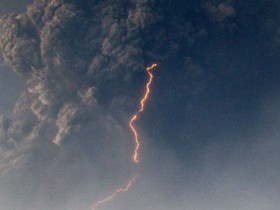
The Guardian, 4 October 2013
www.theguardian.com/news/2013/oct/04/weatherwatch-volcanic-ash-lightning
Kate Ravilious on research into why some volcanic eruptions produce more spectacular electrical storms than others
READ ARTICLE AT The Guardian
Sniffing Cancer: dogs lead the way to a simple breath test

Cosmos, 1 October 2013
www.cosmosmagazine.com/issue/issue-53-sniffing-cancer/
Sniffing Cancer: dogs lead the way to a simple breath test
READ ARTICLE AT Cosmos
Weatherwatch: Autumnal chill in the September air
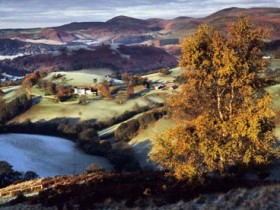
The Guardian, 15 September 2013
www.theguardian.com/news/2013/sep/15/weatherwatch-september-autumn-frost
Kate Ravilious on the likelihood of frost in Britain this month
READ ARTICLE AT The Guardian
Weatherwatch: An epic voyage – with following winds
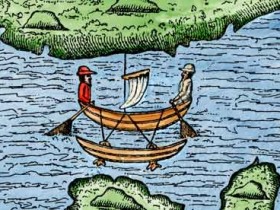
The Guardian, 6 September 2013
www.theguardian.com/news/2013/sep/06/weatherwatch-voyage-wind-current-marianas
Kate Ravilious reports on recent research into the origins of the Marianas islanders
READ ARTICLE AT The Guardian
Weatherwatch: Where will lightning strike next?
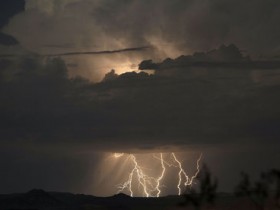
The Guardian, 30 August 2013
www.theguardian.com/news/2013/aug/30/weatherwatch-lightning-strike-research
Kate Ravilious on new research that may make it possible to provide a long range warning of potentially dangerous lightning by studying thunderstorm ‘halos’
READ ARTICLE AT The Guardian
Weatherwatch: Getting ahead of hurricanes

The Guardian, 18 August 2013
www.theguardian.com/news/2013/aug/18/weatherwatch-hurricanes-forecast-gps
Kate Ravilious reports on a new tool that will help meteorologists forecast the track of hurricanes by measuring distortion in GPS signals
READ ARTICLE AT The Guardian
Weatherwatch: Heatwave? That depends…
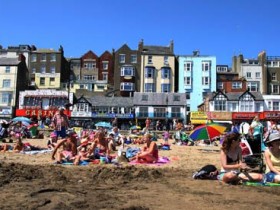
The Guardian, 2 August 2013
www.theguardian.com/news/2013/aug/02/weatherwatch-heatwave-temperature-emergency
Kate Ravilious explains that the definition of a heatwave depends on where you live
READ ARTICLE AT The Guardian
Art installation brings you face to face with fracking
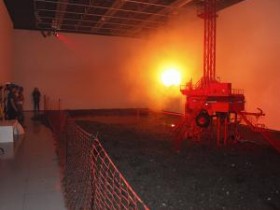
New Scientist, 18 July 2013
www.newscientist.com/article/dn23889-art-installation-brings-you-face-to-face-with-fracking.html#.Uimx-NlAozk
Not sure what to make of fracking? You can at least taste its effects at a miniature fracking rig drilling into a gallery floor in Liverpool, UK
READ ARTICLE AT New Scientist
Weatherwatch: A record year for landslides?
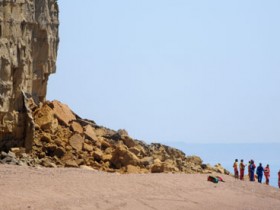
The Guardian, 13 July 2013
/www.theguardian.com/news/2013/jul/14/weatherwatch-landslides-rain
Kate Ravilious asks if it was just the rain that caused last year’s number of recorded landslides – more than two and a half times the annual average
READ ARTICLE AT The Guardian
Weatherwatch: The wind that shapes Earth’s atmosphere

The Guardian, 5 July 2013
www.theguardian.com/news/2013/jul/05/weatherwatch-plasmaspheric-wind-space-atmosphere
Kate Ravilious on an elusive space wind, that hurtles around Earth’s plasmasphere at around 5,000 kilometres per hour. Predicted by scientists for years, its existence has only just been confirmed
READ ARTICLE AT The Guardian
Weatherwatch: Clouds that shine in the polar nights
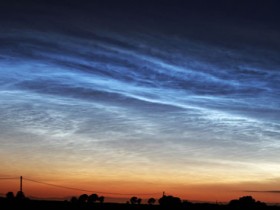
The Guardian, 16 June 2013
www.theguardian.com/news/2013/jun/16/weatherwatch-noctilucent-clouds-solar-activity-rockets
Kate Ravilious reports on high-level noctilucent clouds, that illuminate summer twilights above Earth’s polar regions.
READ ARTICLE AT The Guardian
Mid-town miners: The hunt for urban treasure

New Scientist, 5 June 2013
www.newscientist.com/article/mg21829192.500-midtown-miners-the-hunt-for-urban-treasure.html?
Could urban prospectors strike it rich under our streets? There is a vast and growing bounty of valuable, abandoned metals waiting to be mined
READ ARTICLE AT New Scientist
Weatherwatch: seeking early warning signs of a deadly twister

The Guardian, 31 May 2013
www.guardian.co.uk/news/2013/may/31/weatherwatch-tornadoes-twisters-oklahoma
Kate Ravilious reports on a project to improve the forecasting of tornadoes – and save lives
READ ARTICLE AT The Guardian
Weatherwatch: Keeping warm under a snowy blanket
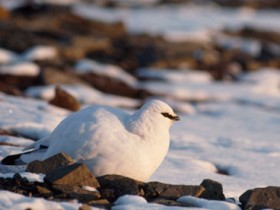
The Guardian, 19 May 2013
www.guardian.co.uk/news/2013/may/19/weatherwatch-snow-thaw-ptarmigan-mountain-hare
Kate Ravilious on the species that thrive under the snow, and the threats they may face as warmer conditions bring earlier snow melt
READ ARTICLE AT The Guardian
Over half the world’s population could rely on food imports by 2050
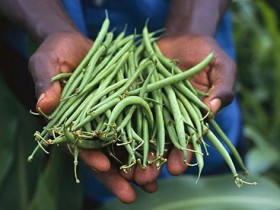
The Guardian, 7 May 2013
www.guardian.co.uk/environment/2013/may/07/half-population-food-imports-2050
Potsdam Institute projection suggests population growth would increase imported food, even without climate change
READ ARTICLE AT The Guardian
Weatherwatch – How climate science saves lives
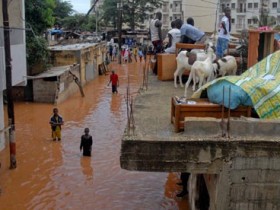
The Guardian, 3 May 2013
www.guardian.co.uk/news/2013/may/03/weatherwatch-africa-floods-rain
Kate Ravilious on a project to give African villagers warning of weather conditions that can threaten lives and livelihoods
READ ARTICLE AT The Guardian
Haunt of the Resurrection Man
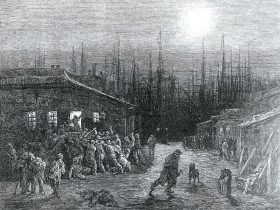
Archaeology, 1 May 2013
www.archaeology.org/issues/89-1305/features/737-royal-london-hospital-burials
A forgotten graveyard, the dawn of modern medicine, and the hard life in 19th-century London
READ ARTICLE AT Archaeology
What sort of weather does a flu virus like best?

The Guardian, 28 April 2013
www.guardian.co.uk/news/2013/apr/28/weatherwatch-flu-vaccination-epidemics
Kate Ravilious reports on research that suggests that flu has definite weather preferences
READ ARTICLE AT The Guardian
The early turd: Our history is written in poo
New Scientist, 25 April 2013
www.newscientist.com/article/mg21829142.100-the-early-turd-our-history-is-written-in-poo.html
Our ancestors’ excrement reveals a rich record of humanity’s movements, culture – and faecal worms
READ ARTICLE AT New Scientist
Weatherwatch: Signs of a clash between cold air and warm air
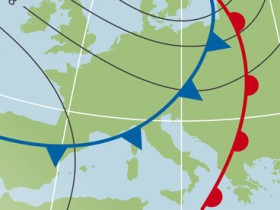
The Guardian, 14 April 2013
www.guardian.co.uk/news/2013/apr/14/weather-fronts-maps
Kate Ravilious on the history of the now familiar weather map symbols representing cold and warm fronts
READ ARTICLE AT The Guardian
Weatherwatch: First measure the snow – then tweet about it
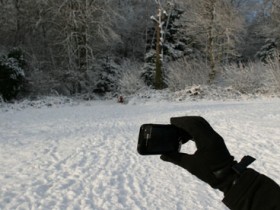
The Guardian, 5 April 2013
www.guardian.co.uk/news/2013/apr/05/snow-measure-tweet-data
Kate Ravilious reports on a project that recruited social media users to help create accurate local weather data
READ ARTICLE AT The Guardian
Weatherwatch: Wind turbines impact on balance and distribution of species
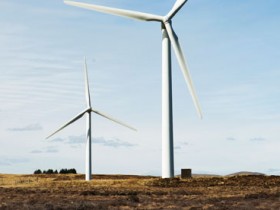
The Guardian, 17 February 2013
www.guardian.co.uk/news/2013/feb/17/weatherwatch-windfarm-turbine-energy
Kate Ravilious on the changes to weather caused by wind farms
READ ARTICLE AT The Guardian
Weatherwatch: Boris was right winters are getting colder

The Guardian, 2 February 2013
www.guardian.co.uk/news/2013/feb/01/weatherwatch-boris-johnson-cold-winter
Kate Ravilious says Siberian winter highs have intensified according to climate scientist Xiangdong Zhang
READ ARTICLE AT The Guardian
Climate change brings colder winters to Europe and Asia
Environmental Research Web, 23 January 2013
environmentalresearchweb.org/cws/article/news/52135
The world is warming, so why have winters been getting colder across much of Eurasia? This question has puzzled climate researchers in recent years. Now a study shows that the icy winter blasts are linked to intensified high-pressure systems hovering over Eurasia during the winter months.
READ ARTICLE AT Environmental Research Web
Yipee – I’ve been awarded an EGU Science journalism fellowship!
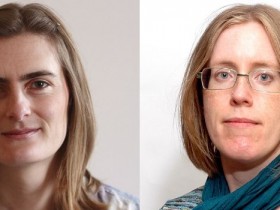
EGU, 21 January 2013
www.egu.eu/news/54/kate-ravilious-and-liz-kalaugher-awarded-egu-science-journalism-fellowship/
The European Geosciences Union (EGU) has named journalists Kate Ravilious and Liz Kalaugher as the winners of its second Science Journalism Fellowship competition for projects on reporting continental earthquakes and climate-change effects on ecosystems, respectively. Ravilious will receive €3,500 to join a research team travelling to central Asia, and Kalaugher €1,500 to cover expenses related to a trip to Finland.
READ ARTICLE AT EGU
Weatherwatch: Forecasts have changed since the Burns’ Day Storm
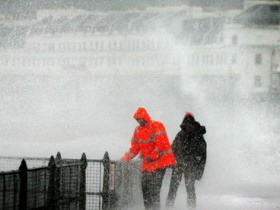
The Guardian, 20 January 2013
www.guardian.co.uk/news/2013/jan/20/weatherwatch-burns-day-storm-predictions
Kate Ravilious explains how weather predictions have changed since the Burns’ Day Storm hit the UK
READ ARTICLE AT The Guardian
Weatherwatch: In need of protection?
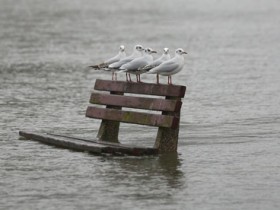
The Guardian, 4 January 2013
www.guardian.co.uk/news/2013/jan/04/weather-insurance-storm-flood-drought
Kate Ravilious on the growth of weather insurance, as farmers and businesses seek cover from the financial effects of extreme weather
READ ARTICLE AT The Guardian
Weatherwatch: How do you make a cloud?
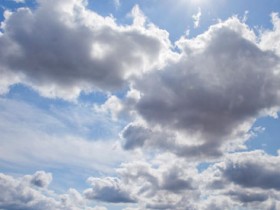
The Guardian, 15 December 2012
www.guardian.co.uk/news/2012/dec/18/weather
How do you make a cloud? It is a problem that has puzzled some of the finest minds, and last week scientists met at the Royal Society of Edinburgh, to celebrate the man who invented the “cloud chamber” – Charles Thompson Rees Wilson
READ ARTICLE AT The Guardian
Weatherwatch: Would modern humans survive a volcanic winter?
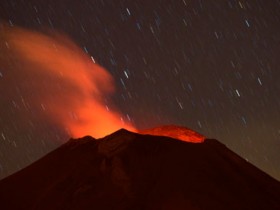
The Guardian, 30 November 2012
www.guardian.co.uk/news/2012/nov/30/weatherwatch-volcano-ash-winter-eruption
Kate Ravilious says archeological evidence indicates our ancestors survived mega volcanic eruptions
READ ARTICLE AT The Guardian
Weatherwatch: The Thames like a windpipe in the city’s lungs

The Guardian, 18 November 2012
www.guardian.co.uk/news/2012/nov/18/weatherwatch-thames-air-flow-lidar
Kate Ravilious says a new study maps the airflow above the river Thames
READ ARTICLE AT The Guardian
White roofs cool clear skies
Environmental Research Web, 9 November 2012
environmentalresearchweb.org/cws/article/news/51451
White roofs in north-east India found to reflect sunlight, potentially minimizing global warming.
READ ARTICLE AT Environmental Research Web
Supercritical geothermal plant cuts energy emissions
Environmental Research Web, 22 October 2012
environmentalresearchweb.org/cws/article/news/51235
The warm rocks that lie deep beneath our feet contain huge amounts of renewable energy, but extracting that energy is challenging. Traditionally, water has been used to recover geothermal heat; potentially waste carbon dioxide could be employed too. A new study assesses how energy efficient this option might be.
READ ARTICLE AT Environmental Research Web
Weatherwatch: So we understand the forecast, but how useful is it?
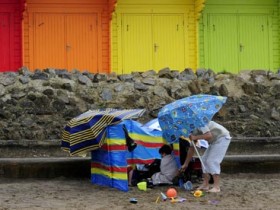
The Guardian, 14 October 2012
www.guardian.co.uk/news/2012/oct/14/weatherwatch-forecasting-games-percentages
Kate Ravilious examines how good people are at assessing probabililstic weather forecasting
READ ARTICLE AT The Guardian
Weatherwatch: Arctic sea ice breakup is bad news for polar bears
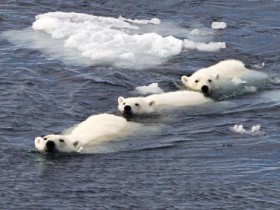
The Guardian, 16 September 2012
www.guardian.co.uk/news/2012/sep/16/weatherwatch-arctic-sea-ice-breakup
Kate Ravilious says a warming Arctic may explain some of our weather trends
READ ARTICLE AT The Guardian
Straight talk with… Mark Sculpher
Nature Medicine, 7 September 2012
www.nature.com/nm/journal/v18/n9/full/nm0912-1315.html
By 2014, the UK will be changing the way it regulates the price it pays for medicines. The government has embraced an idea known as value-based pricing (VBP), with negotiations on how the system will work due to begin this month. One of the most influential thinkers on the UK’s proposed system is health economist Mark Sculpher, director of the Programme on Economic Evaluation and Health Technology Assessment at the University of York. Kate Ravilious met with Sculpher to discuss the value of VBP.
READ ARTICLE AT Nature Medicine
LIDAR networks could help track volcanic ash clouds
Environmental Research Web, 29 August 2012
environmentalresearchweb.org/cws/article/news/50647
Volcanoes can cause havoc in the air as well as on the ground. Dust from the eruption of Iceland’s Eyjafjallajökull volcano in spring 2010 shut down much of European airspace for days at a time. Meanwhile, the eruption of Pinatubo in the Philippines in 1991 suppressed global temperatures for two or three years. Observing how and where a volcanic ash cloud disperses is difficult, but a new study demonstrates how LIDAR (optical remote sensing) can complement satellite data and help to minimize the disruption that explosive volcanoes can cause.
READ ARTICLE AT Environmental Research Web
Weatherwatch: What is normal weather?

The Guardian, 19 August 2012
www.guardian.co.uk/news/2012/aug/19/weatherwatch-climate-drought-temperature
Kate Ravilious says perhaps it is no surprise that ‘normal’ is a little warmer than it used to be
READ ARTICLE AT The Guardian
High speed rail could benefit California
Environmental Research Web, 26 July 2012
environmentalresearchweb.org/cws/article/news/50336
Another airport runway or a high-speed railway line slicing across the land? It is a debate that has been raging in the UK (a third runway at Heathrow versus a high-speed rail link up Britain’s west coast) and is under consideration in many other parts of the world. Governments must make tough decisions about which kind of transport systems to invest in to meet future needs.
READ ARTICLE AT Environmental Research Web
Weatherwatch: Meteosat-10 launched to track weather systems

The Guardian, 15 July 2012
www.guardian.co.uk/news/2012/jul/15/weatherwatch-satellite-meteosat-data
Kate Ravilious looks at how satellite data has transformed weather forecasting
READ ARTICLE AT The Guardian
Weatherwatch: I hear Thunder, Oh don’t you? Pitter patter raindrops
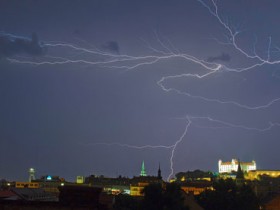
The Guardian, 29 June 2012
www.guardian.co.uk/news/2012/jun/29/weatherwatch-thunderstorms-euro2012-floods
Kate Ravilious on how thunderstorms remind us the weather is beyond our control
READ ARTICLE AT The Guardian
From forestry to geoengineering, silicate weathering counts
Environmental Research Web, 27 June 2012
environmentalresearchweb.org/cws/article/news/50085
Watch out for rocks. From harvesting trees to growing crops – or even geoengineering the Earth’s climate – many of our activities have an intimate relationship with the weathering of the Earth’s crust. Now research shows how important it is to obtain good estimates of local rock-weathering rates if we are to avoid upsetting these finely balanced natural cycles.
READ ARTICLE AT Environmental Research Web
Weatherwatch: Those clouds that ‘float on high o’er vales and hills’
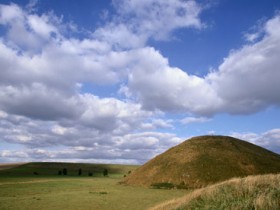
The Guardian, 17 June 2012
www.guardian.co.uk/news/2012/jun/17/weatherwatch-clouds-wordsworth-cumulus?INTCMP=SRCH
Kate Ravilious says June’s skies have been dominated by stratus clouds rather than cumulus clouds
READ ARTICLE AT The Guardian
Centralized wastewater treatment in California wins on energy efficiency
Environmental Research Web, 7 June 2012
environmentalresearchweb.org/cws/article/news/49866
Flush the toilet and you send around 9 litres of water down the drain. Having a shower adds another 30 litres or so, while a steaming bath contributes around 80 litres. In total the average person in the UK gets through around 150 litres of water every day. But where does all this water go and what is the environmental impact of flushing it all away?
READ ARTICLE AT Environmental Research Web
Reversing proves a tricky manoeuvre
Environmental Research Web, 22 May 2012
environmentalresearchweb.org/cws/article/news/49667
What do climate change and rubber bands have in common? A new modelling study shows that many Earth systems behave like rubber bands, by not reversing smoothly down the same path that they were stretched along. This means that many of the changes brought about by global warming, such as sea-level rise and drought, will persist for some time even if we manage to reduce atmospheric CO2.
READ ARTICLE AT Environmental Research Web
Weatherwatch: When Swallows fly high, the weather will be dry
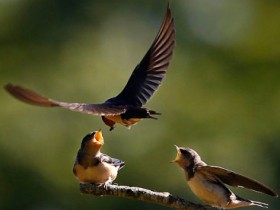
The Guardian, 20 May 2012
www.guardian.co.uk/news/2012/may/20/weatherwatch-birdwatching-swallows-folklore
Kate Ravilious looks at the truths of weather folklore
READ ARTICLE AT The Guardian
Why is the black crowberry heading north?
Environmental Research Web, 3 May 2012
environmentalresearchweb.org/cws/article/news/49509
Warmer temperatures in the future are predicted to make many northern hemisphere plants march northwards. For some plant species, such as the “black crowberry”, this northward migration appears to have already begun; but is the movement really due to climate change? New research suggests that rising temperatures cannot explain it all.
READ ARTICLE AT Environmental Research Web
Weatherwatch: Making a splash for umbrella manufacturers
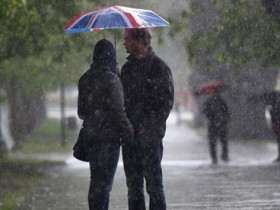
The Guardian, 29 April 2012
www.guardian.co.uk/news/2012/apr/29/weatherwatch-april-showers-rainfall
Kate Ravilious looks at the tradition of April showers
READ ARTICLE AT The Guardian
Development, pollution and dredging threaten seagrass more than climate change
Environmental Research Web, 27 April 2012
environmentalresearchweb.org/cws/article/news/49419
Seagrass: it might not sound very exciting, but according to experts these extensive marine flowering plants form the basis of one of the most productive ecosystems on Earth. In recent decades seagrass habitats have come under threat, from anthropogenic activities and climate change, and currently there is little consensus about which threats are causing the greatest damage. Now a study has pooled knowledge to create a resource to inform management of this valuable natural habitat.
READ ARTICLE AT Environmental Research Web




































